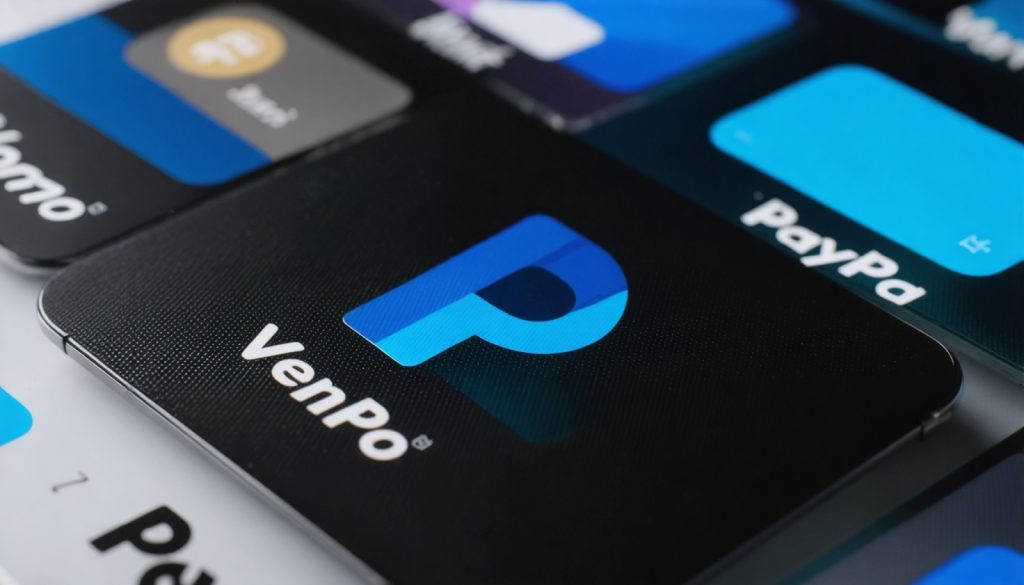
- PayPal and Venmo now support transactions for Chainlink (LINK) and Solana (SOL), expanding their cryptocurrency offerings.
- This move is a strategic effort to enhance user engagement and integrate digital currencies into everyday life.
- Chainlink offers real-world data integration, improving transparency and reliability in smart contracts.
- Solana provides a high-speed, low-cost blockchain environment suitable for decentralized finance and innovative projects.
- PayPal’s expansion reflects its commitment to incorporating digital currencies following its initial foray into cryptocurrencies in 2020.
- The initiative highlights PayPal’s collaboration with regulators to shape the future of digital finance thoughtfully.
- This development empowers users, offering them more flexibility and control over their financial activities through enhanced digital wallet features.
The digital finance landscape is shimmering with fresh possibilities as PayPal and its subsidiary Venmo unfurl a new chapter for cryptocurrency enthusiasts. The platforms have teemed up the potential of their users’ wallets by enabling direct transactions of Chainlink (LINK) and Solana (SOL), broadening the horizons of their crypto offerings. It’s not just a nod to customer feedback; it’s a strategic play to unlock more of the digital world.
Step into the bustling marketplace of today’s digital currencies—where data flows as a lifeline across networks and interlinking blockchains is as crucial as laying railroad tracks in the 19th century. Chainlink, thriving on computation and cross-chain bridges, aligns seamlessly with these ambitions. Its allure lies in its ability to access real-world data—boosting transparency and reliability across smart contracts.
Parallelly, Solana emerges as a titan in this realm. Like a digital metropolis, it buzzes with decentralized finance, gaming, and novel infrastructure, inviting users to partake and innovate. Solana’s low-cost, high-speed blockchain solutions offer a vision where financial transactions are instantaneous and borderless—a vision these platforms now empower users to navigate firsthand.
The addition of LINK and SOL to PayPal and Venmo’s crypto catalog is more than just an update; it’s a commitment to weaving digital currencies into the fabric of everyday life. Since PayPal’s pivotal turn towards cryptocurrency in 2020, when they first introduced Bitcoin, Ethereum, Bitcoin Cash, and Litecoin, the global finance landscape has shifted towards digital. The once hesitant whispers about blockchain technology and decentralized finance are now a chorus of progress.
PayPal’s stride into the digital realm wasn’t just about adoption but collaboration—engaging with regulators to contour the future of digital currencies thoughtfully. Behind these pioneering efforts, a vision unfolds where digital infrastructure shapes how commerce, both global and local, thrives in tomorrow’s world.
With this fresh expansion for business and personal users alike, PayPal and Venmo are echoing a profound truth: Currency is more than coins and paper—it’s dynamic, evolutionary, and inclusive. The stage is set within their ecosystem, offering users enhanced flexibility and agency over their financial journeys, as they can now effortlessly buy, move, or spend within the trusted bounds of their digital wallets.
The key takeaway here is one of empowerment. As PayPal and Venmo enlarge their crypto offerings, users are not just given more options—they are invited to become architects in the emerging digital economy. So, as your smartphone vibrates with the latest update, consider it a handshake with the future, where finance is not only a transaction but an experience. Welcome to the next dimension of digital currency.
How PayPal and Venmo’s Crypto Expansion Shapes the Future of Digital Finance
The financial world continues to evolve rapidly with PayPal and Venmo’s recent integration of Chainlink (LINK) and Solana (SOL) into their cryptocurrency offerings. These strategic additions reflect not only customer demand but also a broader commitment to embracing the potential of digital currencies in everyday transactions. Here’s a closer look at these developments and their impact on the digital finance landscape.
Innovations in Cryptocurrency Integration
Understanding Chainlink (LINK) and Solana (SOL)
– Chainlink (LINK): Chainlink stands out in the blockchain industry for its ability to connect smart contracts with real-world data, ensuring transparency and reliability. This capability is crucial for sectors that rely on accurate external data input to execute automated contracts, such as insurance and supply chain management.
– Solana (SOL): Known for its high-speed transactions and low fees, Solana is widely used in decentralized finance (DeFi) and gaming. Its scalable architecture makes it an ideal choice for applications requiring fast and frequent transactions.
Strategic Implications for PayPal and Venmo
– Expanding User Engagement: By adding LINK and SOL, PayPal and Venmo are providing users with more control over their financial decisions and a wider array of investment opportunities, thereby increasing user engagement and satisfaction.
– Broadening Crypto Adoption: This move signals to millions of users that cryptocurrencies are not merely niche investments but viable options for transactions and savings.
Market Forecasts & Industry Trends
– Rising Cryptocurrency Adoption: As platforms like PayPal and Venmo become more integrated with cryptos, experts predict that mainstream adoption will accelerate, potentially increasing the overall market cap of digital currencies.
– Decentralized Finance Growth: With platforms supporting more cryptocurrencies like SOL, the DeFi space is expected to see more development and investment, expanding from technological spheres to mainstream financial services.
Real-World Use Cases
– Transaction Speed and Cost: Solana’s integration allows users to experience almost instant transactions at a fraction of the traditional cost, making it ideal for cross-border payments and microtransactions.
– Smart Contracts and Automation: Chainlink’s role in bringing real-world data into blockchain technology means users can engage in complex transactions like automated payouts in insurance and derivatives.
Pros & Cons Overview
Pros
– Increased Accessibility: Offers more options for users looking to diversify their crypto portfolios.
– Enhanced Security: By collaborating with established platforms, users can trust the security and reliability of their transactions.
Cons
– Volatility Risk: Cryptocurrencies like LINK and SOL are subject to significant price fluctuations, which can pose risks to novice investors.
– Regulatory Challenges: As digital currencies become more mainstream, regulatory scrutiny is likely to increase, potentially affecting how these services operate.
Actionable Recommendations
– Start Small: If you’re new to cryptocurrencies, begin with small transactions to understand how digital wallets operate within PayPal and Venmo.
– Stay Informed: Keep up with market trends and news related to Chainlink, Solana, and other cryptocurrencies to make informed decisions.
– Diversify Investments: Explore diversifying your crypto portfolio to mitigate volatility risks.
Conclusion
As PayPal and Venmo continue to integrate more cryptocurrencies, they are not only supporting current fintech trends but actively shaping the future of finance. By enabling more users to seamlessly interact with digital currencies, these platforms are encouraging a more dynamic and inclusive financial ecosystem. Whether you are a veteran crypto enthusiast or a newcomer, understanding these developments can help you navigate the evolving landscape of digital finance.



